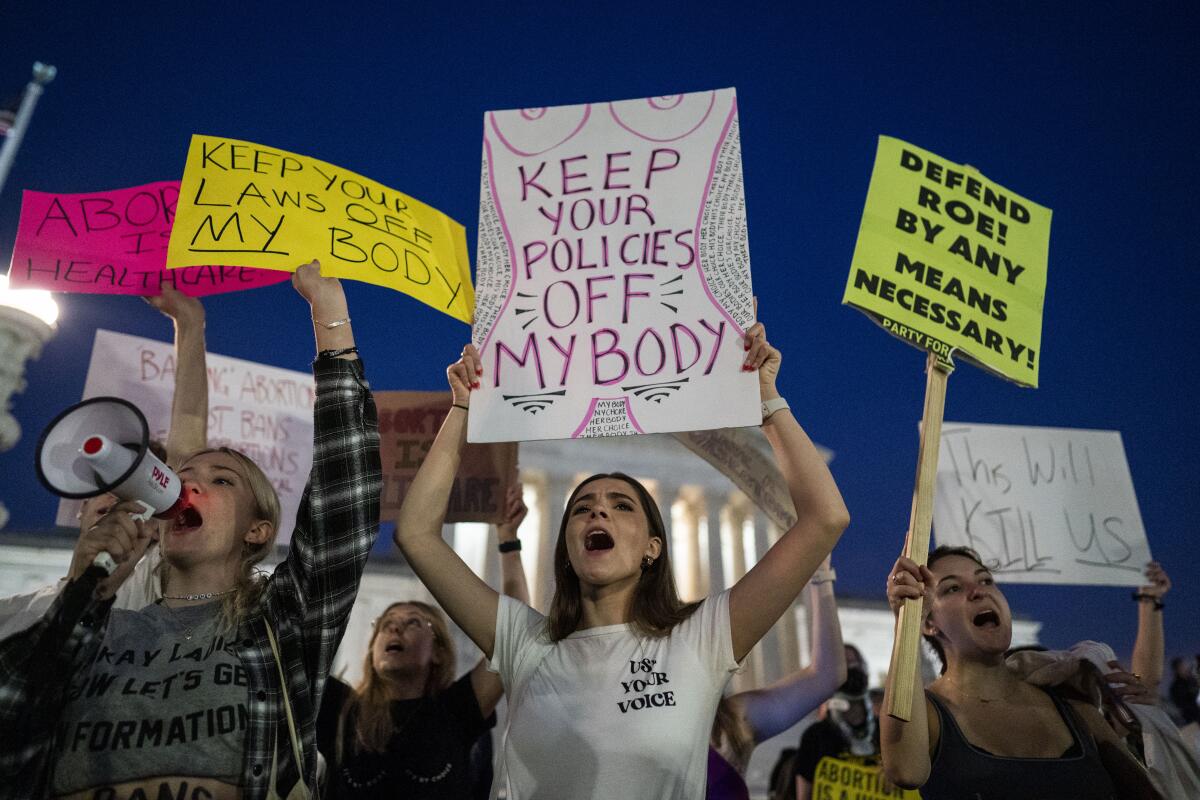Democrats keep pushing to bolster California’s role as an abortion sanctuary

- Share via
Democratic lawmakers introduced a package of bills this week to further bolster California’s role as an abortion haven after last year’s repeal of the landmark Supreme Court ruling in Roe vs. Wade.
Though Gov. Gavin Newsom signed several laws last year to expand abortion access in California in response to the Supreme Court’s decision, Democratic legislators said more are needed to protect the privacy of people seeking abortions, safeguard abortion providers and expand insurance coverage. Their goal is to strengthen the state’s abortion infrastructure for Californians as well as for patients from other states where abortion has been restricted or outlawed.
“We cannot rest at all in this onslaught,” state Sen. Nancy Skinner (D-Berkeley) said at a news conference in the state Capitol on Monday, where the Legislative Women’s Caucus unveiled 17 bills.
“We have a great package of bills to further reproductive justice, to further the protections to people who may end up coming to our state, to our dispensers and to our healthcare providers.”
On Friday, Skinner filed legislation that would provide legal protections to California doctors or pharmacists who prescribe or dispense abortion pills to out-of-state patients.
The new bill, SB 345, would prevent healthcare providers who are legally performing their jobs in California from facing prosecution in another state or being extradited — a growing concern as more states move to criminalize abortion and other reproductive healthcare.
“I’m trying to protect our healthcare practitioners so they can do their jobs, without fear,” Skinner said after filing the legislation. She said the bill, if passed, would “protect those practitioners in California who are acting in California and following California’s laws.”
Skinner’s proposal also would provide legal protections for healthcare workers in California prescribing or dispensing contraception or gender-affirming care, no matter a patient’s geographic location.
Bills in the package announced earlier in the week would expand privacy protections for people seeking abortion, contraception, or pregnancy health care. AB 254 by Assemblymember Rebecca Bauer-Kahan (D-Orinda) would strengthen privacy rules for data shared on digital apps, such as fertility or pregnancy trackers. Her AB 352 would bolster privacy for medical records related to abortion or pregnancy loss that are shared through electronic health information exchanges.
AB 793 seeks to shield people from digital surveillance related to reproductive health care by eliminating so-called reverse demands in which law enforcement agencies can ask tech companies for the identities of people searching specific terms such as “medication abortion,” said Assemblymember Mia Bonta (D-Alameda).
Other bills in the package would add new requirements for insurance companies. AB 571 by Assemblymember Cottie Petrie-Norris (D-Irvine) would require medical malpractice insurance to cover sexual and reproductive health, which she said is necessary to keep some clinics open and able to provide abortion access. AB 1432 by Assemblymember Wendy Carrillo (D-Los Angeles), would require health insurance companies based outside California to cover abortion and gender-affirming care to policyholders in the state.
The new legislation also includes efforts to expand public awareness of abortion options and other reproductive health services. AB 598 requires public school districts to administer a survey to students in grades seven to 12 that includes “information about obtaining abortions during different stages of pregnancy,” according to the bill by Assemblymember Buffy Wicks (D-Oakland).
AB 710 would create a public information campaign about crisis pregnancy centers that do not offer abortions, though the details were not yet fleshed out. An earlier California law that compelled faith-based pregnancy centers that oppose abortion to notify patients that the state offers subsidized abortions was struck down by the Supreme Court in 2018.
“When women need access to healthcare, it’s critical that the information they get is factual and providers have best interests in mind, not an agenda to discourage you from seeking an abortion,” said Assemblywoman Pilar Schiavo (D-Chatsworth), author of AB 710.
Kristin Turner, executive director of the nonproft Pro-Life San Francisco, said AB 710 will make it harder for abortion opponents to support women during their pregnancies. But she said the legislation that concerned her most is AB 1646, which will allow out-of-state medical students to practice abortion and gender-affirming care in California for 90 days.
“If California does this, our biggest export will be murdered children,” Turner said. “If Gov. Newsom signs these bills, it won’t just be his hands that are covered in blood, it will be his entire office.”
The bills introduced in California’s Democrat-dominated Capitol reflect the divide between red states and blue states that has grown deeper since the Supreme Court overturned the Roe vs. Wade decision last year, ending constitutional protections for abortion that had been in place for nearly 50 years. In its ruling, the court said the Constitution does not protect the right to abortion, allowing states to outlaw or restrict the procedure.
In California, the ruling set off a rush by Newsom and Democratic lawmakers to protect and expand access to abortion and encourage people from states restricting the procedure to turn to the Golden State for care.
In 2022, Newsom signed 15 abortion protection and reproductive health bills that provide safe sites, eliminate copays for procedures, and protect against out-of-state investigations. In November, the state’s voters enshrined abortion rights into California’s Constitution by passing Proposition 1.
“We’re not done,” Bauer-Kahan said Monday. “It has been less than a year since the overturning of Roe v. Wade, and California has taken incredible strides to protect access to abortion services. The Women’s Caucus is ready to work and continue to ensure that every single woman and pregnant person who comes to California seeking abortion care has access to the services in a safe, accessible and dignified manner.”
More to Read
Sign up for Essential California
The most important California stories and recommendations in your inbox every morning.
You may occasionally receive promotional content from the Los Angeles Times.











